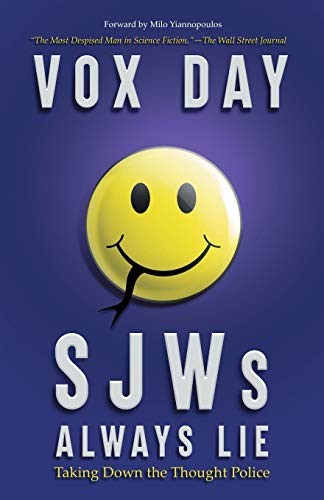Sami Sundell reviewed SJWs Always Lie by Vox Day
Review of 'SJWs Always Lie' on 'Goodreads'
1 star
The book starts with a foreword by Milo Yiannopoulos, building a strawman of a SJW, and the actual book keeps on building it to magnificent proportions. And of course it must, since "This is a cultural war, not a garden party", and in war you must demonize your enemy.
Next comes Day's beef with SFWA; he first kind of implies he was expelled because of his failed attempt at presidency, later he insinuates the expulsion might have been because he caught John Scalzi lying about his blog traffic. That pretty much makes no sense.
From that point on, it continues by lamenting over various people losing their jobs because of SJW attacks, by celebrating various people losing their jobs because of GamerGate attacks, and then with strategy suggestions on how to best deal with SJWs in a community. Apparently it's the quiet old ladies who you should be worried about, …
The book starts with a foreword by Milo Yiannopoulos, building a strawman of a SJW, and the actual book keeps on building it to magnificent proportions. And of course it must, since "This is a cultural war, not a garden party", and in war you must demonize your enemy.
Next comes Day's beef with SFWA; he first kind of implies he was expelled because of his failed attempt at presidency, later he insinuates the expulsion might have been because he caught John Scalzi lying about his blog traffic. That pretty much makes no sense.
From that point on, it continues by lamenting over various people losing their jobs because of SJW attacks, by celebrating various people losing their jobs because of GamerGate attacks, and then with strategy suggestions on how to best deal with SJWs in a community. Apparently it's the quiet old ladies who you should be worried about, and it's best to get rid of them quick.
Day doesn't seem to like codes of conduct, and he notes the way they are often vague. Admittedly that may be the case. In a perfect world, the code of conduct would be "Don't be an ass", and people would get along nicely. Since people don't seem to know what that means, though, those codes tend to be more wordy and still leave a lot to be desired.
Effects of that ambiguity of rules can be seen in one of the examples of the book: Don Imus apparently was fired over some comments, even though "all the previous, more offensive comments" were overlooked. In addition to Day not recognizing that standards for acceptable behavior change over time, it's also kind of weird to see a person's earlier, worse behavior used as an excuse for not taking action on bad behavior later.
All the way, the book is full of half truths and unfounded opinions. Here's one of my favorites:
We also managed to tip the scale and ensure that Cixin Liu's hard science fiction novel, The Three-Body Problem, won Best Novel over Katherine Addison's tedious SJW angst-fest, The Goblin Emperor.
Day fails to mentionthat The Three-Body Problem wasn't part of either Rabid or Sad Puppies slate. In fact, neither The Goblin Emperor nor The Three-Body Problem were part of the original 2015 Hugo finalists: they were replacements after Larry Correia and Marko Kloos declined their nominations. Nicely "ensured".
The book ends with Aristotle, dialectic and rhetoric - former "based on the construction of logical syllogisms", latter using "incomplete or invalid arguments that merely take the form of syllogisms". Guess how I would describe this book?

